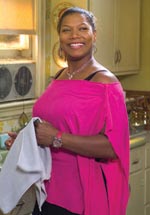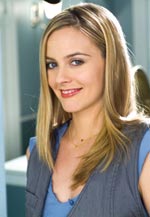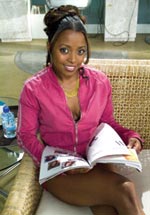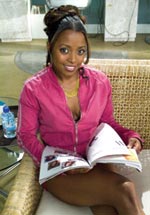 |
Like many African-American women, I’ve got an almost religious relationship with my hair appointment. Once every two weeks, I make my pilgrimage to the Crown and Glory Hair Salon, where I sit under the ministry of Cheryl, who’s got “growing hands.” There, Cheryl and whichever other customers or hairdressers are there serve as surrogate mothers, sisters, counselors, doctors, preachers, sociologists, whatever. And sometime during the evening—maybe while my head is in the sink, under the dryer, being clipped or curled—somebody’s going to end up talking about men.
So when I realized I’d double-booked—the press screening for Beauty Shop and my regular hair appointment were on the same day—I thought to myself: This had better be worth it.

Hairdresser Gina (Queen Latifah), first encountered in Barbershop 2: Back in Business, is the mother of a musically gifted daughter, Vanessa (Paige Hurd). The recently widowed Gina has left her booth at the beauty shop in Chicago and moved to Atlanta so Vanessa can attend a performing arts school. But Vanessa enjoyed sharing music with her father, so the grieving tween’s rehearsals feature technical virtuosity, but lack joy.
Meanwhile, Gina is frustrated with her work. She’s stuck at a chi-chi salon owned by snobbish Jorge, played with clipped English in a vaguely French/Eastern European accent by a metrosexual Kevin Bacon with highlights. When Gina and Kevin get into yet another argument over her refusal to follow his arbitrary salon hierarchy, she leaves, determined to open her own shop. The story of Gina’s struggle to open and maintain her new salon (amidst the jealous Jorge’s attempts to thwart her) and Vanessa’s rediscovery of her joy in music make up the film.

This comedy’s plot outline is fairly similar to that of Barbershop (2002) and Barbershop 2 (2004), and ensemble cast includes comedian Adele Givens as radio host Helen; Keshia Knight-Pulliam (remember Rudy from The Cosby Show?) as Gina’s younger sister-in law; Alfre Woodard as an kente cloth-wearing middle-aged woman with a penchant for quoting Maya Angelou’s poem “Phenomenal Woman”; Sherri Shepherd and Golden Brooks as stylists and Alicia Silverstone in a role similar to Troy Garrity’s Isaac Rosenberg in Barbershop—the lone white person who struggles to find acceptance in a predominantly black environment. Djimon Hounsou plays Joe, a piano-playing electrician who helps Gina set up her shop and shows her how to open her heart to the possibility of new love.
There are a few big laughs here, but mostly just scattered chuckles throughout. Though Latifah’s character is warm, confident and resilient, others are a bit sketchy: for example, Pulliam’s Darnelle’s main purpose seems to be to wear skimpy clothing, look put out and get herself in trouble by hanging out with would-be hustlers. Silverstone’s Lynn is loopy and forced, and MacDowell’s character is a steel magnolia without the steel. Brooks tends to play the same kind of character: the icy-toned, sneering sista who doesn’t mind waggling a finger or snapping her neck to make her point.

More interesting than the film’s setting (and the relatively colorful group of stock characters) are some of the issues it raises: How to find the courage to start over or pursue a new direction, and the ups and downs of entrepreneurship and self-reliance. All in all, it’s a warm and fairly enjoyable film.
The film also has a thought-provoking treatment of race and class issues. For example, when Gina is denied a business loan to open the shop and suggests it might be because she’s African-American, the white loan manager suggests they talk about Gina’s “secured credit cards—as opposed to you throwin’ around your race one.” Gina decides to use her charm instead, joining the manager in the ladies’ room and giving her a mini-makeover to convince her to give her the loan.

One of the subplots deals with Lynn’s attempts to fit in with her fellow hairdressers, and with the women’s grudging (and frankly, fairly sudden) acceptance of her and her interracial relationship with James. When Lynn confides in Gina that she doesn’t feel accepted, Gina reminds her that just like Lynn befriended her at Jorge’s shop, she’ll befriend her at hers—and that sticking it out allows people to see who you are and warm up to you. White and black women come to the shop, and race isn’t a gauge of trustworthiness: Villains and heroes are white and black.
A few things keep this film from being family-friendly. There’s quite a bit of casual swearing and sex talk. One subplot concerns the hairdressers’ speculation about whether or not James is gay.
The overall message is that everyone benefits from honesty with one another, with themselves and with finding a supportive community. And while that may or may not be worth skipping your hair appointment for, it’s a good enough reason to see the film—maybe with a couple of girls from the beauty shop.
Talk About It
Discussion starters- What gives Gina and her daughter the strength to start over and pursue new dreams?
- Why do you think it’s so hard for Lynn to fit in at the beauty shop? Why did the other hairdressers treat her the way they did? When it comes to fitting in with a different group of people, how much should you change yourself? How should you reach out to people who are trying to fit in?
- What does it mean to be a “phenomenal woman”? A “phenomenal man”? How does Darnelle learn this?
- Joe tells Vanessa to “follow your heart” when it comes to music. In life, is this good advice? Why or why not?
The Family Corner
For parents to considerThis PG-13 film has a lot of casual swearing and sexual humor. There are a few uses of the n-word.
Photos © Copyright MGM
What Other Critics Are Saying
compiled by Jeffrey Overstreetfrom Film Forum, 04/07/05Queen Latifah steals the show, as usual, in the new comedy Beauty Shop, which unapologetically mimics the ensemble-comedy dynamics of the recent box office hit Barbershop. She plays Gina, a hairdresser who works at a hip Atlanta salon while her daughter attends music school. When Jorge (Kevin Bacon), her boss, disrespects her one time too many, she bails on the business and opens her own shop with the help of a co-worker (Alicia Silverstone).
Her business is apparently more successful than the comedy.
LaTonya Taylor (Christianity Today Movies) finds “a few big laughs here, but mostly just scattered chuckles.” She’s more impressed with the “thought-provoking treatment of race and class issues. The overall message is that everyone benefits from honesty with one another, with themselves and with finding a supportive community.”
Michael Elliott (Movie Parables) was disappointed. “Beauty Shop should have been a slam dunk success. It isn’t. The problem is that none of these characters make much of an impression and watching their stories play out is as interesting as watching hair dry. The problem seems to be in the script which, although it copies the general framework of Barbershop, is totally missing the energy and edgy humor that made that film successful.”
Marcus Yoars (Plugged In) says, “If the plot for Beauty Shop seems a little thin, that’s because it is. And if it feels a little familiar, that’s because it’s a virtual duplicate of the first two Barbershop movies (minus the political potshots). I’ll give the movie’s creators … every benefit of the doubt for having good intentions. But positive messages found in this slice of inner-city life are often lost amidst misguided attempts at ‘keepin’ it real.'”
Harry Forbes (Catholic News Service) had a good time, calling it “a perfect showcase for the likable Latifah, who also served as one of the producers. The eclectic ensemble cast … not all of them generally known for comedy, makes for interesting watching. Despite some salty language—even from a streetwise youngster—and salon sex chatter, overall Beauty Shop imparts solid messages about loyalty, friendship and parenting.”
But Lori Souder (Christian Spotlight) writes, “If you can look past all the taking of the Lord’s name in vain, all the references to sex and drugs, the endless comparing of body parts and disrespect to women, you might be able to get a laugh or two out of this movie. Its heart is in the right place, and the story line with Gina is great, but apparently it was thought that the audience would require constant sexual references and trashy language or they would fall asleep.”
Mainstream critics says this shop needed to offer more plot and something better than less sitcom-style amusement.
Copyright © 2005 Christianity Today. Click for reprint information.












